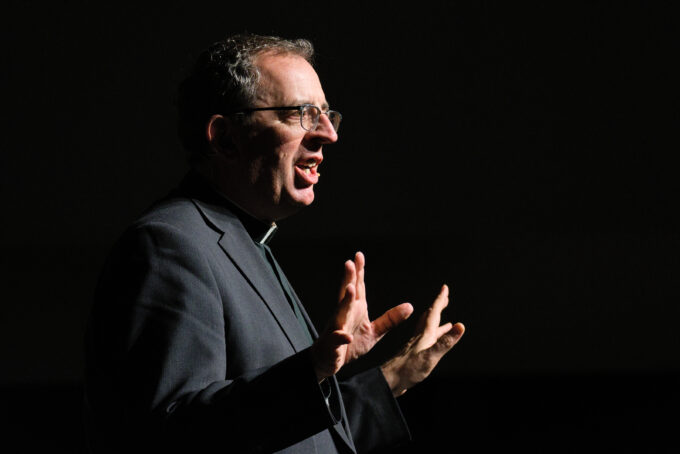55th Forum of the Swiss Management Association: "Don't lose contact".
The 55th Forum of the Swiss Management Association (SMG) brought together a who's who of entrepreneurs from the global economy in Zurich. With almost 300 participants, this year's conference was dedicated to the topic of "Losing touch? (Losing touch?) and reflected on when the "grip" between management and employees is missing - and how to prevent this?

The Swiss Management Association was founded in 1961 from the Swiss Institute of Business Administration (BWI) and the ETH Swiss Management Association (SMG). With 1200 leading decision-makers in the Swiss economy, it represents a significant association. Through its networking and platform function, the SMG serves as a source of inspiration for entrepreneurs, C-level executives and board members dealing with strategic and operational management issues as part of its event.
At the 55th Forum, not only courageous captains of industry but also illustrious guests from the worlds of fashion, religion and science had their say.
Ilaria Venturini Fendi: "Luxury with social responsibility."
The fashion entrepreneur, designer and organic farmer has made a break with fast fashion for more sustainability. Ilaria Venturini Fendi comes from the famous Fendi family. The fashion company was sold to the LVMH group in 2001, and she herself left in 2003. Looking back, she was bothered by the fact that everything was happening faster and faster:
"Today, collections are out of date as soon as they are launched. Globalization did its part - along with the financial world, which grew together with fashion." In 2006 she founded Carmina Campus and from then on still produced fashion, but new as sustainable products paired with social projects. She was able to take up her old craft again - but with a different perspective and purpose. So today the products are made from recycled materials in Africa or Italian prisons, among other places.
"High-quality luxury from sustainable products combined with social projects is not a contradiction." Ethical products are the result. This is "not charity, just work", emphasises the entrepreneur.
Kamila Markram: "We need to make science publicly accessible."
Kamila Markram is co-founder and CEO of Frontiers and a neuroscientist and autism researcher at EPF Lausanne. She is convinced that science saves lives. Science, she says, has positively impacted lives time and time again. For example, 1.1 billion lives have been saved through blood transfusions.
Today there are eight million researchers in the world. New discoveries are being made all the time. The bad news is that this cycle is blocked by the way research results are published: Of the 2.4 million research papers published each year, 80% to 90% are hidden behind paywalls. Researchers themselves do not get access to these scientific journals. They have an embargo of one year. This leads to 2.4 million years of delays caused by this.
To put an end to this, Frontiers was founded as an open science platform. Everyone has access to this data worldwide. Sponsors and the universities pay for the papers to be published publicly. These are also reviewed. Frontiers now employs 444 people in seven countries. Plus 90,000 scribes and reviewers who contribute as part-timers. According to Kamila Markram, the platform aims to solve the world's four challenges:
The 20,000 diseases that have not yet been cured, food for all people, enough energy for all people and a healthy planet. There is hope, says Kamila Markram: "Science has already saved the earth several times. The immense progress has been achieved despite severely limited access to data. What we need to do is make science publicly available. That should lead to an acceleration of innovation."
Richard Coles: "Values that lead people to resilience and sustainability should provide stability in dynamic change."
Reverend Richard Coles (pictured) is now a minister and BBC radio announcer. In his youth he was a member of the pop band "The Communards", which produced several top 10 hits - including "Don't Leave Me This Way", the best-selling single in the UK charts in 1986. It was an unusual career to become a minister in the Anglican Church. It was for him journey back to his own origins. At the age of 40 he entered a monastery. He wanted to learn about people's fears and needs. "This is the place to address the big questions of life." On the subject of "losing touch" with traditional values and whether money is the new religion, he said, "I don't think money is a new religion. Money is a tool that can be used positively or negatively."
The business model of the church is not wrong, he says, it is not a business model at all. He wants to change the church from within. "The church represents the traditional and conservative, but also has very important messages. Values that lead people to resilience and sustainability should give stability in dynamic change."
Risto Siilasmaa: "We talked about the behavior that creates the most successful environment possible."
Risto Siilasmaa has been Chairman of Nokia Corporation since 2012. He has been a member of the Board of Directors since 2008 and has therefore experienced the entire crisis of the Finnish company. "Connecting people" was the long-standing slogan of the technology company Nokia, until it lost its global market leadership. The company is already 150 years old. It also made televisions, PCs, tires and cleaning cloths. In 2008, Nokia had a 50 percent share of the global mobile phone market.
When Risto Siilasmaa became president of Nokia in 2012, the company was suffering a loss of two billion a year. People were already predicting the date of bankruptcy. Today Nokia is a different company. Throughout the transformation, an extremely large number of administrative meetings were held. Risto Siilasmaa:
"Through strong collaborative work, new trust emerged. We talked about the behaviors that would create the most successful environment possible." "Golden rules" were developed by the board, for example: "A board meeting where we don't laugh out loud is a miserable failure."
Risto Siilasmaa wrote a book so that all employees could see what mistakes had been made. Nokia now has an open space and open door policy.
Bernard "Bernie" Ecclestone: "Trusting people is easy when they do what they say."
Bernard "Bernie" Ecclestone was Formula 1 boss for 40 years. An entrepreneur "by instinct". After starting his career with a gas/petrol company, he later sold motorcycles and established the largest distribution network for motorcycle and car manufacturers in Kent. He diversified into real estate and began his involvement in motorcycle racing.
From the age of 16 he raced motorcycles, and later cars. Then he ran the Lotus F2 team and later bought the Connaught Formula One team and Brabham. In 1972 he virtually took over Formula One and in 1987 sold Brabham to devote himself entirely to the commercial development of the sport. He single-handedly transformed Formula One from an expensive hobby for wealthy racers into the global, multi-billion dollar business and most popular annual sporting event in the world that it is today.
Looking back, he experienced his life opportunistically, "I don't care what next week is. I deal with things when they're there and take the opportunities." Nor would he do anything differently: "I have no regrets. I always consider right from the start if it's worth it." He says you have to understand yourself, keep both feet on the ground and do the best you can: "That also means staying normal. Whatever I organized, I did myself."
He experienced resigning after so long as easy: "I was dismissed." He said it was easy for him to trust other people, "It's easy when they do what they say." As for the future, he explained, "As long as a sport entertains the audience, it will survive."
How to stay personally connected in the future
"Losing touch" was nothing new, it was just often suppressed, explains Wolfgang J. Pfund, Head of Human Resources and Logistics at Suva. Bosses had gathered employees around them and then thought they were in good contact and a relationship. Pfund: "There is a great opportunity to become more honest. The topic of being in a relationship is the topic of tomorrow."
This includes, for example, not losing the break culture. But arguing without hurting is also an important part of the relationship. - Allowing emotions, becoming tangible, standing by them when things are not going so well.
"Customers are increasingly flexible and always want new things. Then companies experience that employees have new needs and values for a variety of reasons," says Thomas Vollmoeller, CEO XING and Chairman of kununu GmbH. He advocates embracing change, seeing change in a positive light and actively shaping it yourself.
"Losing touch" has a lot to do with trust, says Antoinette Weibel, Professor of Human Resources Management at the University of St. Gallen. Companies tend to slide towards mistrust because management strongly believes in (success) figures. It is her task to show how much money can be lost if there is a lack of trust. She recommends humility and the ability to listen, to engage with others, to be pro-active and to get involved. Hire people who can and are allowed to disagree.









